Related Research Articles

Sofia Costanza Brigida Villani Scicolone, known professionally as Sophia Loren, is an Italian former actress. With a career spanning over 70 years, she was named by the American Film Institute as one of the greatest stars of classical Hollywood cinema and is one of the last surviving major stars from the era. Loren is also the only remaining living person to appear on AFI's list of the 50 greatest stars of American film history, positioned 21st.

Two Women is a 1960 war drama film directed by Vittorio De Sica from a screenplay he co-wrote with Cesare Zavattini, based on the 1957 novel of the same name by Alberto Moravia. The film stars Sophia Loren, Jean-Paul Belmondo, Eleonora Brown and Raf Vallone. It tells the story of a woman trying to protect her young daughter from the horrors of war. The story is fictional, but based on actual events of 1944 in Rome and rural Lazio, during the Marocchinate.
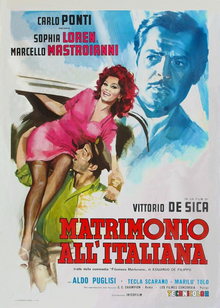
Marriage Italian Style is a 1964 romantic comedy-drama film directed by Vittorio De Sica, starring Sophia Loren and Marcello Mastroianni.
Villani is an Italian surname that can also be found in France. Notable people with the surname include:
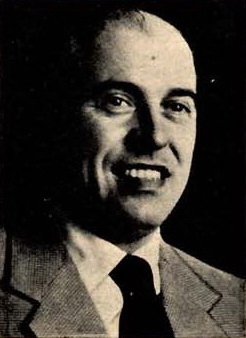
Carlo Fortunato Pietro Ponti Sr.OMRI was an Italian film producer with more than 140 productions to his credit. Along with Dino De Laurentiis, he is credited with reinvigorating and popularizing Italian cinema post-World War II, producing some of the country's most acclaimed and financially-successful films of the 1950s and 1960s.
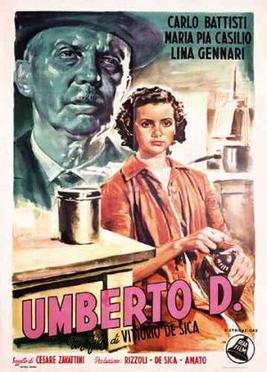
Umberto D. is a 1952 Italian neorealist film directed by Vittorio De Sica. Most of the actors were non-professional, including Carlo Battisti who plays the title role of Umberto Domenico Ferrari, a poor elderly man in Rome who is desperately trying to keep his rented room. His landlady is evicting him and his only true friends, the housemaid and his dog Flike are of no help.
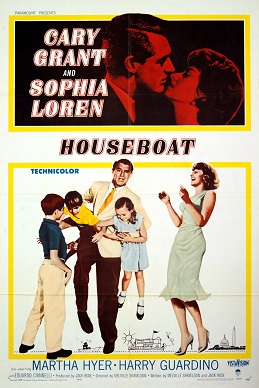
Houseboat is a 1958 American romantic comedy film directed by Melville Shavelson. The songs, "Almost In Your Arms" sung by Sam Cooke, and "Bing! Bang! Bong!", sung by Sophia Loren, were written by Jay Livingston and Ray Evans. It was presented in Technicolor and VistaVision.
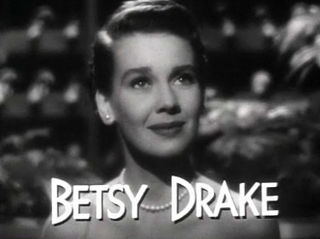
Betsy Drake was an American actress, writer and psychotherapist. She was the third wife of actor Cary Grant.
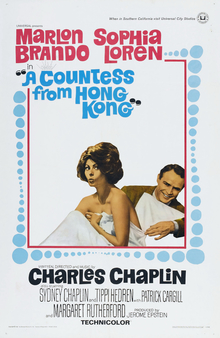
A Countess from Hong Kong is a 1967 British romantic comedy film scored, written, and directed by Charlie Chaplin, and the final film directed, written, produced and scored by him. Based on the life of a former Russian aristocrat, as he calls her in his 1922 book My Trip Abroad. She was a Russian singer and dancer who "was a stateless person marooned in France without a passport." The film starred Marlon Brando and Sophia Loren, and revolved around an American diplomat who falls in love with a stowaway on a cruise. Sydney Chaplin, Tippi Hedren, Patrick Cargill and Margaret Rutherford co-star in major supporting roles; Chaplin also made a cameo, marking his final screen appearance.
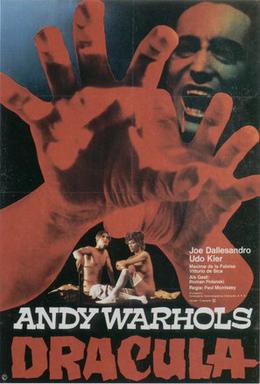
Blood for Dracula is a 1974 horror film written and directed by Paul Morrissey and starring Udo Kier, Joe Dallesandro, Maxime McKendry, Stefania Casini, Arno Juerging, and Vittorio de Sica. Upon its initial 1974 release in West Germany and the United States, Blood for Dracula was released as Andy Warhol's Dracula.
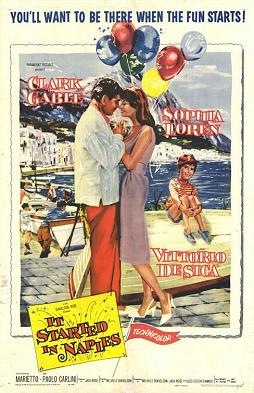
It Started in Naples is a 1960 American romantic comedy film directed by Melville Shavelson and produced by Jack Rose from a screenplay by Suso Cecchi d'Amico, based on the story by Michael Pertwee and Jack Davies. The Technicolor cinematography was directed by Robert Surtees. The film stars Clark Gable, Sophia Loren, Vittorio De Sica and an Italian cast. This was Gable's final film to be released within his lifetime and his last film in color.
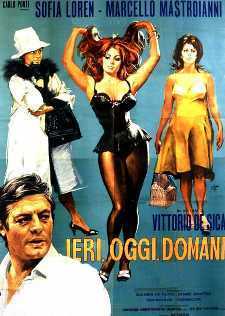
Yesterday, Today and Tomorrow is a 1963 comedy anthology film by Italian director Vittorio De Sica. It stars Sophia Loren and Marcello Mastroianni. The film consists of three short stories about couples in different parts of Italy. The film won the Academy Award for Best Foreign Language Film at the 37th Academy Awards.

Two Women is a 1957 Italian-language novel by Alberto Moravia. It tells the story of a woman trying to protect her teenaged daughter from the horrors of war. When both are attacked and the virgin daughter raped, the daughter suffers PTSD.
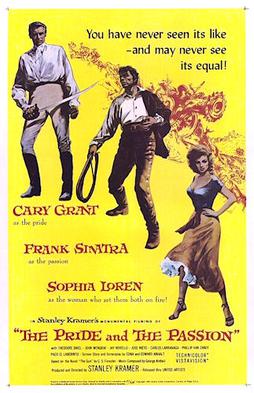
The Pride and the Passion is a 1957 American Napoleonic-era war film in Technicolor and VistaVision from United Artists, produced and directed by Stanley Kramer, starring Cary Grant, Frank Sinatra and Sophia Loren. The film co-stars Theodore Bikel and Jay Novello.

A Breath of Scandal is a 1960 American/Italian international co-production romantic comedy-drama film directed by Michael Curtiz, based on the stage play Olympia by Ferenc Molnár. It stars Sophia Loren, Maurice Chevalier, and John Gavin, with Angela Lansbury, Milly Vitale, Roberto Risso, Isabel Jeans, and Tullio Carminati. The film is set at the turn of the 20th century and features lush technicolor photography of Vienna and the countryside of Austria. The costumes and lighting were designed by George Hoyningen-Huene and executed by Ella Bei of the Knize fashion house (Austria). In part because Loren was at odds with Curtiz's direction, Italian director Vittorio De Sica was hired to reshoot certain scenes with Loren after hours without Curtiz's knowledge.

Sunflower is a 1970 Italian/French international co-production drama film directed by Vittorio De Sica. It was the first western movie to be filmed in the USSR. Some scenes were filmed near Moscow, while others near Poltava, a regional center in Ukraine.

That Kind of Woman is a 1959 American drama film directed by Sidney Lumet, who was nominated for the Golden Bear at the 9th Berlin International Film Festival. It stars Sophia Loren and Tab Hunter. The screenplay by Walter Bernstein, based on a short story by Robert Lowry, is highly reminiscent of the 1938 film The Shopworn Angel.
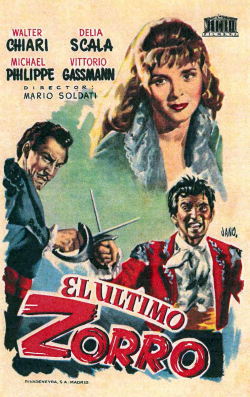
The Dream of Zorro is a 1952 Italian comedy adventure film directed by Mario Soldati and starring Walter Chiari, Delia Scala and Vittorio Gassman. The future star Sophia Loren had a minor role in the film.
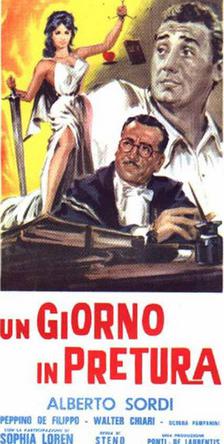
A Day in Court is a 1954 Italian comedy film directed by Steno and starring Peppino De Filippo, Silvana Pampanini, Sophia Loren, and Alberto Sordi. The film is an anthology, consisting of a day's cases before Judge Salomone Lo Russo in a court in Rome.
Marianna Pia "Maria" Villani Scicolone is an Italian television personality, columnist and singer.